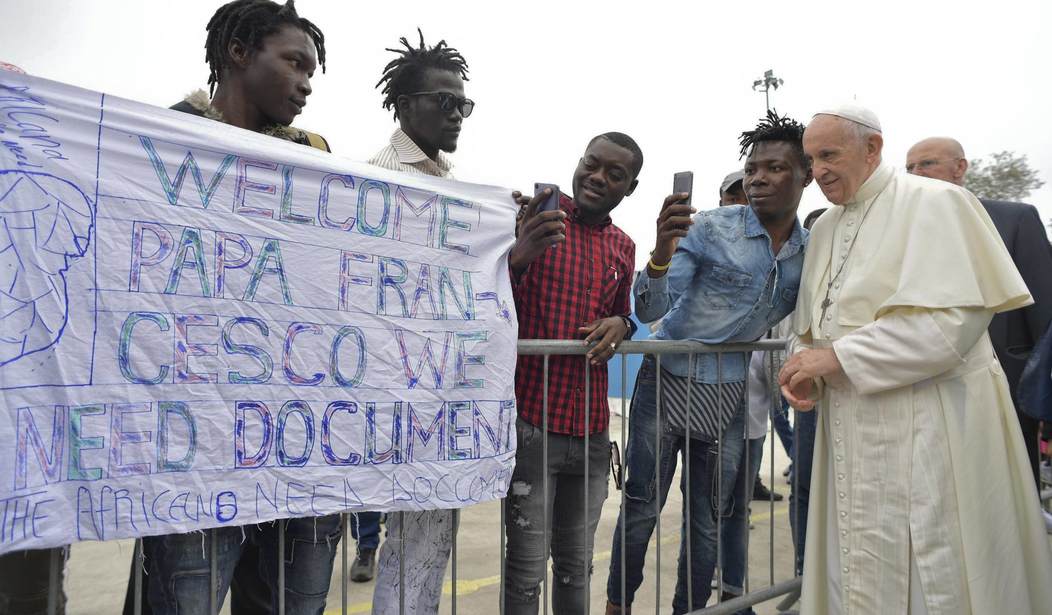Pope Francis said in his 2018 World Day of Peace message released Friday that governments need to check violent rhetoric that is putting migrants at risk in their destination countries.
In the message, “Migrants and Refugees: Men and Women in Search of Peace,” the pope remembered more than 250 million migrants worldwide, of whom 22.5 million are refugees.
“Pope Benedict XVI, my beloved predecessor, spoke of them as ‘men and women, children, young and elderly people, who are searching for somewhere to live in peace,'” he said. “In order to find that peace, they are willing to risk their lives on a journey that is often long and perilous, to endure hardships and suffering, and to encounter fences and walls built to keep them far from their goal.”
“In a spirit of compassion, let us embrace all those fleeing from war and hunger, or forced by discrimination, persecution, poverty and environmental degradation to leave their homelands.”
Pope Francis said it’s “not enough to open our hearts to the suffering of others,” but welcoming the stranger requires “concrete commitment, a network of assistance and goodwill, vigilant and sympathetic attention, the responsible management of new and complex situations that at times compound numerous existing problems, to say nothing of resources, which are always limited.”
Governments “should take practical measures to welcome, promote, protect, integrate” migrants, he said, with “a clear responsibility towards their own communities, whose legitimate rights and harmonious development they must ensure.”
“Most people migrate through regular channels. Some, however, take different routes, mainly out of desperation, when their own countries offer neither safety nor opportunity, and every legal pathway appears impractical, blocked or too slow,” Pope Francis continued.
“Many destination countries have seen the spread of rhetoric decrying the risks posed to national security or the high cost of welcoming new arrivals, and by doing so demeans the human dignity due to all as sons and daughters of God,” he said. “Those who, for what may be political reasons, foment fear of migrants instead of building peace are sowing violence, racial discrimination and xenophobia, which are matters of great concern for all those concerned for the safety of every human being.”
He noted that “all indicators available to the international community suggest that global migration will continue for the future.”
“Some consider this a threat,” the pontiff added. “For my part, I ask you to view it with confidence as an opportunity to build peace,” stressing that migrants “do not arrive empty-handed.”
“They bring their courage, skills, energy and aspirations, as well as the treasures of their own cultures; and in this way, they enrich the lives of the nations that receive them. We also come to see the creativity, tenacity and spirit of sacrifice of the countless individuals, families and communities around the world who open their doors and hearts to migrants and refugees, even where resources are scarce.”
Pope Francis called for four-pronged action: first, “expanding legal pathways for entry and no longer pushing migrants and displaced people towards countries where they face persecution and violence”; second, acting on “our duty to recognize and defend the inviolable dignity of those who flee real dangers in search of asylum and security, and to prevent their being exploited.”
Third, he said, is “supporting the integral human development of migrants and refugees” including “ensuring access to all levels of education for children and young people.” Last comes “allowing refugees and migrants to participate fully in the life of the society that welcomes them, as part of a process of mutual enrichment and fruitful cooperation in service of the integral human development of the local community.”
Pope Francis quoted Saint John Paul II: “If the ‘dream’ of a peaceful world is shared by all, if the refugees’ and migrants’ contribution is properly evaluated, then humanity can become more and more a universal family and our earth a true ‘common home’.”
“Throughout history, many have believed in this ‘dream,’ and their achievements are a testament to the fact that it is no mere utopia,” Francis added.









Join the conversation as a VIP Member